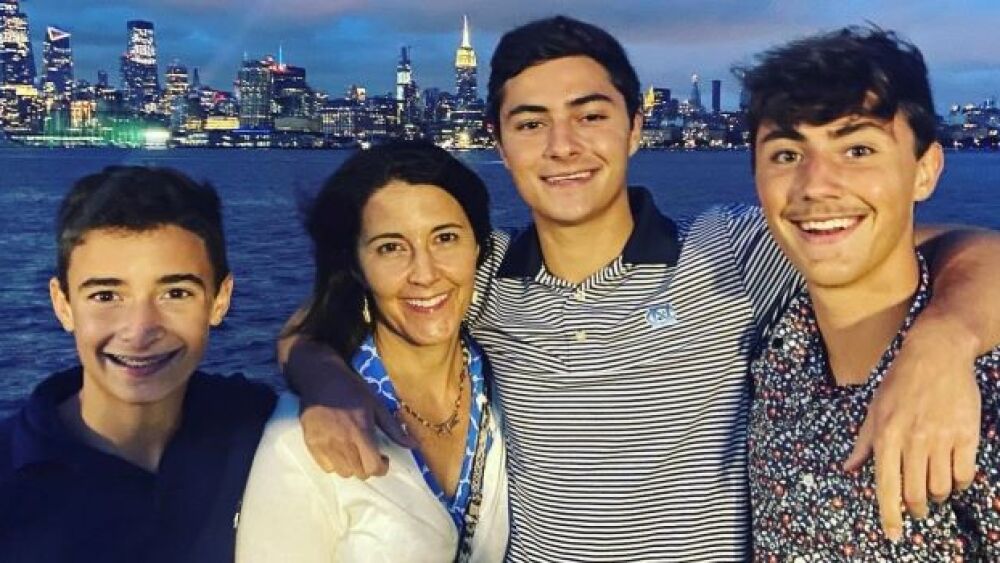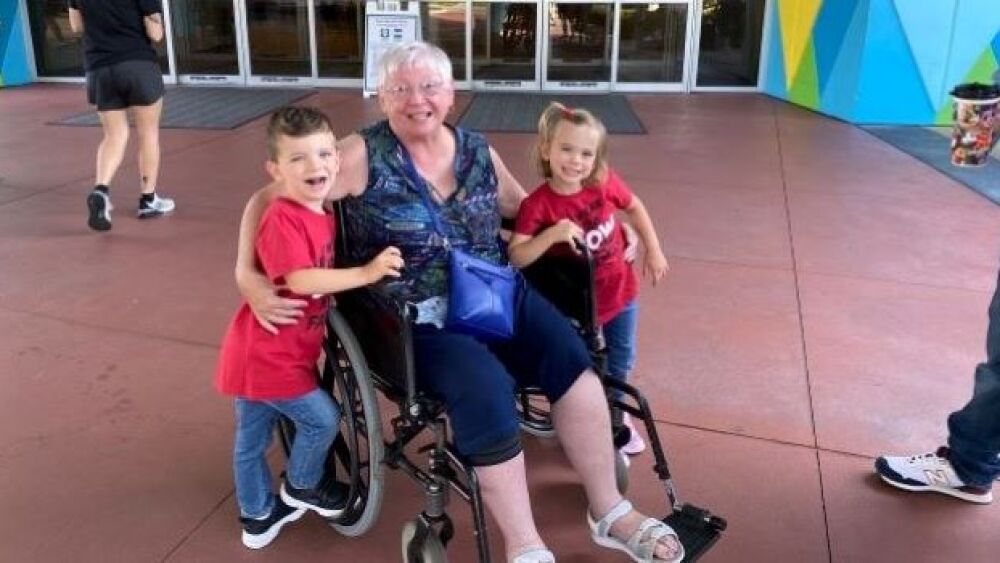Tofersen is the furthest along of four ASOs currently in clinical development for ALS and as such, there is quite a bit riding on the results of the VALOR trial which has an estimated completion date of August 31st, 2021.
Lisa Stockman Mauriello and her three sons/Photo courtesy of Lisa Stockman Mauriello
After the plight and advocacy of Lisa Stockman Mauriello drew the attention of a nation, Biogen made a promise to offer an expanded access program (EAP) for its investigational Amyotrophic Lateral Sclerosis (ALS drug), tofersen. The program is set to begin in mid-July, once patients from its Phase III VALOR trial transition from placebo to active treatment.
Biogen appears to be following through. According to a notice on its website, beginning June 25, physicians could apply on behalf of patients who meet the inclusion/exclusion criteria. The company states that it will be ready to ship tofersen to eligible sites as of July 15, but some patient families say that it is not clear what the qualification criteria actually is.
“I even worry that they might say ‘she doesn’t have enough functionality for it to be worth giving it to her, we don’t think it’s going to help her,’ so they might even just deny her for one reason or another, which woud be one final kick in the family jewels,” said Bob Mauriello, Lisa’s husband of 25 years.
Cynthia Weber with grandchildren, Frankie and Lincoln Haddad, pictured above./photo courtesy of Cassandra Haddad.
Cassandra Haddad’s mother, Cynthia Weber, possesses the same A5V mutation in the SOD1 gene as Stockman Mauriello. Her family is cursed with a tragic genetic history. There is a 50/50 chance that family members will carry this mutation, and if they do, there is a high probability that they will become symptomatic in their lifetime.
The A5V mutation is particularly devastating, moving rapidly and typically killing its victims within 12 months.
Tofersen, an antisense oligonucleotide (ASO), targets a mutation in the superoxide dismutase 1 (SOD1) gene. It aims to reduce the production of the SOD1 protein and slow the fatal progression of the disease.
Haddad, a nurse practitioner from Lancaster, Pennsylvania, attempted to enroll Weber in the Phase III VALOR trial. Like Stockman Mauriello, she was denied because the trial was already full. Haddad appealed but was turned down in January.
In the span of one week this month, Weber went from walking on her own to being fitted for a power wheelchair. After originally being told that she didn’t qualify because the rapid progression was too recent, Haddad received the news just prior to press time that Biogen was prepared to move forward with the treatment.
“I’m scared to even get my hopes up. It has been an emotional rollercoaster, but I’m so thankful to have some cautious hope again! Hopefully, everything works out where she will get it. That’s one of the tricky parts of EAP - who gives it, who pays?”
In the first phase of the 2-part program, Biogen will offer compassionate access to a subset of the SOD1-ALS population with the most rapidly progressive disease.
Cynthia Weber is the 32nd person in her family to suffer from this brutal form of ALS. Haddad was given the family tree documentation but tucked it away until her uncle, Duane Lindsey, was diagnosed.
“There were 30 documented deaths. My uncle was number 31 since they started keeping record of deaths,” Haddad said. “The day my uncle died, my mom’s ALS actually turned on. That day, she couldn’t lift her foot off the floor. At first, she thought it was in her head, but it became rapidly apparent that it wasn’t.”
Lindsey was a participant in the VALOR trial, and Haddad is seeking access to Tofersen for her mother due to the change she witnessed in his condition.
“It not only stopped progressing, he got movement back in his leg. I don’t know if that’s typical, but he was able to move his toe and had a little bit more hip flexor movement again,” Weber shared.
It is important to note that the VALOR trial is a randomized, placebo study.
Dr. Neil Shneider, Stockman Mauriello’s physician and a co-investigator on the VALOR trial, has been outspoken about his efforts to secure Tofersen for his patient. He told BioSpace that he made inquiries on Lisa’s behalf when EAP was first announced, and that he has since been contacted by Biogen and the Clinigen Group, which will run the program.
The SOD1 mutation is the second most common form of inherited, or familial ALS, accounting for up to 20% of these cases and 2% of all ALS incidences.
“SOD1, although a rare form of ALS, has a special place in the minds of ALS investigators and clinicians. We’ve been after this gene now for 30 years, so it’s been a long time in coming” said Shneider, who is also director of the Eleanor and Lou Gehrig ALS Center at Columbia University.
Tofersen is the furthest along of four ASOs currently in clinical development for ALS and as such, there is quite a bit riding on the results of the VALOR trial which has an estimated completion date of August 31, 2021.
“There’s something of a proof of concept going on here. We need to demonstrate at least in one case, where we know the gene, that knocking that gene out, targeting that gene through antisense therapy, has a positive effect on the disease course,” Shneider said.
Shneider added that the results of the VALOR study will be meaningful not only for other forms of familial ALS, but also sporadic ALS, and more broadly for other neurodegenerative diseases.
“There’s the larger interest of the neurodegenerative disease community. It [Tofersen] would be the first ASO after Spinraza to treat a neurological disease,” he said.
Biogen has a strong track record in this space. In 2016, Spinraza (Nusinersen), an ASO that acts on the SMN2 gene, became the first drug approved by the FDA to treat Spinal Muscular Atrophy (SMA), a leading genetic cause of death in infants and toddlers. Like tofersen, Biogen co-developed Spinraza with Ionis Pharmaceuticals.
For Stockman Mauriello, even if she is granted compassionate to tofersen, it is probably too late.
“She has progressed dramatically over the five months that I have known her. I think that her chances of benefiting from this are very small, even if she does get it,” Shneider said.
Another key question for researchers: what causes a carrier of the SOD1 gene like Stockman Mauriello to become symptomatic?
“For the first 50-plus years of her life before she developed symptoms of ALS, she carried this gene mutation, but didn’t have ALS. Then something changed. Something happened after her 50th birthday and she developed the disease. The question is, what is the trigger? What initiates the process that leads to symptom development?”
That’s what Biogen’s ATLAS trial is trying to answer. The study, which began on May 17, is evaluating the efficacy of tofersen in clinically presymptomatic adult carriers of the SOD1 mutation.
“Understanding that, those earlier steps in the pathogenesis and in the development of the disease, is really important,” Shneider said. “The ATLAS study is trying to see whether presymptomatic treatment with tofersen, knocking down SOD1 before the problem begins, can delay if not prevent the initiation of the disease.”
For Cassandra Haddad, trials such as this one offer hope.
“Now, with Biogen, there’s the ATLAS trial, and we don’t just have to sit back and wait to die. We can try and do something about it now,” she said.
If tofersen does prove to be effective, it may also provide some solace for the Mauriello family.
“I do hope that tofersen and other things work, so even if it doesn’t benefit Lisa, it could benefit our kids,” Mauriello said, referring to their three sons. “Or even if somehow none of them end up getting it, then obviously the other people who have SOD1.”







